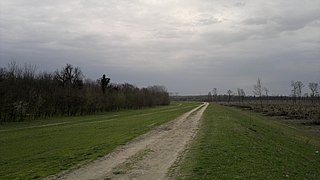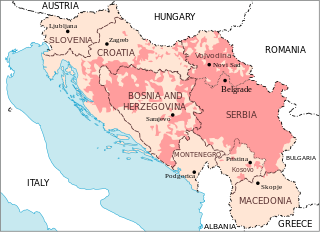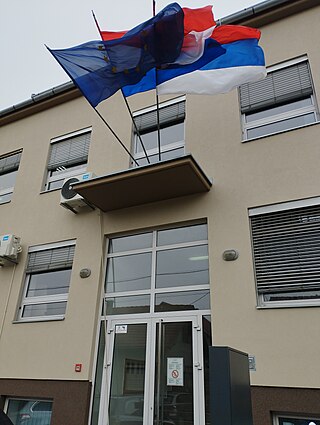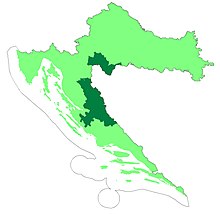The politics of Croatia are defined by a parliamentary, representative democratic republic framework, where the Prime Minister of Croatia is the head of government in a multi-party system. Executive power is exercised by the Government and the President of Croatia. Legislative power is vested in the Croatian Parliament. The Judiciary is independent of the executive and the legislature. The parliament adopted the current Constitution of Croatia on 22 December 1990 and decided to declare independence from Yugoslavia on 25 May 1991. The Constitutional Decision on the Sovereignty and Independence of the Republic of Croatia came into effect on 8 October 1991. The constitution has since been amended several times. The first modern parties in the country developed in the middle of the 19th century, and their agenda and appeal changed, reflecting major social changes, such as the breakup of Austria-Hungary, the Kingdom of Serbs, Croats and Slovenes, dictatorship and social upheavals in the kingdom, World War II, the establishment of Communist rule and the breakup of the SFR Yugoslavia.

The Republic of Serbian Krajina or Serb Republic of Krajina, known as the Serbian Krajina or simply Krajina, was a self-proclaimed Serb proto-state, a territory within the newly independent Republic of Croatia, which it defied, and which was active during the Croatian War of Independence (1991–95). It was not recognized internationally. The name Krajina ("Frontier") was adopted from the historical Military Frontier of the Habsburg monarchy (Austria-Hungary), which had a substantial Serb population and existed up to the late 19th century. The RSK government waged a war for ethnic Serb independence from Croatia and unification with the Federal Republic of Yugoslavia and Republika Srpska.
Regular elections in Croatia are mandated by the Constitution and legislation enacted by Parliament. The presidency, Parliament, county prefects and assemblies, city and town mayors, and city and municipal councils are all elective offices. Since 1990, seven presidential elections have been held. During the same period, ten parliamentary elections were also held. In addition, there were nine nationwide local elections. Croatia has also held three elections to elect members of the European Parliament following its accession to the EU on 1 July 2013.

Markušica is a village and a municipality in Vukovar-Syrmia County in eastern Croatia. Markušica is located south of the river Vuka and northwest of the town of Vinkovci. Landscape of the Markušica Municipality is marked by the Pannonian Basin plains and agricultural fields of corn, wheat, common sunflower and sugar beet.

Negoslavci is a village and a municipality in Vukovar-Syrmia County in eastern Croatia. It is located south of the town of Vukovar, seat of the county. Landscape of the Negoslavci Municipality is marked by the Pannonian Basin plains and agricultural fields of maize, wheat, common sunflower and sugar beet.

Jagodnjak is a village and a municipality in the Osijek-Baranja County, Croatia. Landscape of the Jagodnjak Municipality is marked by the Drava river with surrounding wetland forest and by Pannonian Basin plains with agricultural fields of corn, wheat, common sunflower and sugar beet.

Krnjak is a village and a municipality in Karlovac County, Croatia.

Vrhovine is a town and a municipality in Lika-Senj County, Croatia. The municipality is part of Lika.

Vinkovački Banovci is a village in Croatia in the region of Syrmia. The village is a part of the Nijemci Municipality.

From August 1990 to November 1991, during the breakup of Yugoslavia, several Serb Autonomous Regions, or Districts were proclaimed in the Yugoslav republics of SR Croatia and SR Bosnia and Herzegovina in light of the possible secession of the republics from the Socialist Federal Republic of Yugoslavia. These were autonomous Serb-inhabited entities that subsequently united in their respective republic to form the Republic of Serbian Krajina in Croatia and the Republika Srpska in Bosnia and Herzegovina.

The Joint Council of Municipalities in Croatia is an elected consultative sui generis body which constitutes a form of cultural self-government of Serbs in the eastern Croatian Podunavlje region. The body was established in the initial aftermath of the Croatian War of Independence as a part of the international community's efforts to peacefully settle the conflict in self-proclaimed Eastern Slavonia, Baranya and Western Syrmia. The establishment of the ZVO was one of the explicit provisions of the Erdut Agreement which called upon the United Nations to establish its UNTAES transitional administration.

Vera is a village in Trpinja Municipality in eastern Croatia. The village is the northernmost settlement of the Vukovar-Syrmia County.
Russians of Croatia are one of the twenty-two national minorities expressly mentioned and defined by law of Croatia. According to the 2011 Census, there were 1,279 Croatian citizens in the country, who identified themselves as Russians, most of them living in Zagreb.

Law on Use of Languages and Scripts of National Minorities is law which defines use of minority languages in Croatia. Additionally Croatian Constitutional law on national minorities rights and The Law on Education in language and script of national minorities explicitly define rights on usage of minority languages in Croatia.
The Serbian language is one of the officially recognized minority languages in Croatia. It is primarily used by the Serbs of Croatia. The Croatian Constitution, Croatian Constitutional law on national minorities rights, Law on Education in Language and Script of National Minorities and Law on Use of Languages and Scripts of National Minorities define the public co-official usage of Serbian in Croatia. Serbian and Croatian are two standardized varieties of the pluricentric Serbo-Croatian language. The majority of Serbs of Croatia use Ijekavian pronunciation of Proto-Slavic vowel jat except in the Podunavlje region in Vukovar-Syrmia and Osijek-Baranja Counties where local Serb population use Ekavian pronunciation. Post-World War II and Croatian War of Independence settlers in Podunavlje which have come from Bosnia, Dalmatia or Western Slavonia either use their original Ijekavian pronunciation, adopted Ekavian pronunciation or both of them depending on context. In 2011 Census majority of Serbs of Croatia declared Croatian standardized variety as their first language with Ijekavian pronunciation always being required standard form in Croatian. While Serbian variety recognizes both pronunciations as standard, Ekavian is the more common one as it is the dominant one in Serbia, with Ijekavian being dominant in Bosnia-Herzegovina, Montenegro and Croatia.

The Constitution of Croatia in its preamble defines Croatia as a nation state of ethnic Croats, a country of traditionally present communities that the constitution recognizes as national minorities and a country of all its citizens. National minorities explicitly enumerated and recognized in the Constitution are Serbs, Czechs, Slovaks, Italians, Hungarians, Jews, Germans, Austrians, Ukrainians, Rusyns, Bosniaks, Slovenes, Montenegrins, Macedonians, Russians, Bulgarians, Poles, Romani, Romanians, Istro-Romanians ("Vlachs"), Turks and Albanians. Article 12 of the constitution states that the official language in Croatia is Croatian, but also states that in some local governments another language and Cyrillic or some other script can be introduced in official use.

The 2019 Croatian national minorities' councils and representatives elections took place on 5 May. The elections were the fifth minority elections since 2003 and near 254,000 citizens of Croatia were entitled to vote on them. In total, 352 councils and 109 representatives were up for election. 14 minority groups were electing their councils while 20 minority groups were electing representatives. 6,686 candidates in total participated in elections which were conducted at 846 polling places. Elections for councils took place in 19 counties of Croatia, City of Zagreb, 68 cities of Croatia and 108 municipalities of Croatia. Elections for representatives took place in 19 counties, City of Zagreb, 34 cities and one municipality.
The 2015 Croatian national minorities' councils and representatives elections took place on 31 May. The elections were the fourth minority elections since 2003 and 278.932 citizens of Croatia were entitled to vote for councils and additional 24.399 for representatives. Citizens over the age of 18 who are members of a certain national minority group were entitled to vote. They had the right to vote in their municipality or town of residence for local council or representative of their minority if such elections are required based on an absolute or relative local minority population. 19 national minority groups in Croatia elected members of 288 councils and 173 individual minority representatives. Voters turnout was 13,5%.
Parliamentary elections will be held in Croatia on or before 22 July 2024 to elect the members of the 11th Sabor.
The 2003 Croatian national minorities councils and representatives elections took place on 18 May. 2003 elections were the first minorities councils and representatives elections after the introduction of the new Constitutional Act on the Rights of National Minorities in the Republic of Croatia in late 2002. Elections took place both at local (municipalities and towns/cities) and regional (county) level with different numbers of electorate at two levels due to the specific provisions of the law.















